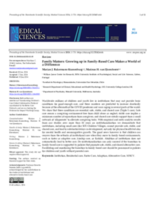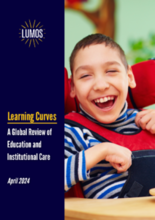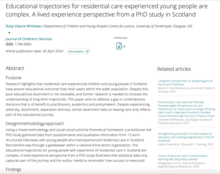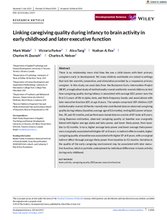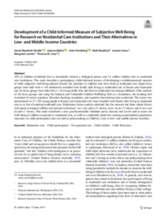Displaying 31 - 40 of 771
This article reviews a study conducted about child development in residential care, foster/kafalah care, and adoptive families. The authors of the study demonstrated that institutions cannot provide safe, stable, and shared care for children, and lead to substantial delays in their development, not only for physical health but also for mental health and neurocognitive growth.
This study aimed to investigate developmental outcomes of children raised in institutions in Switzerland in conditions of psychosocial deprivation and to identify possible risk and protective factors at institutional and child levels.
In this chapter, the authors explore the intricate relationships between young disabled children, their families, institutional settings, and disability services in Canada, with an emphasis on the challenges stemming from unstable custodial dynamics and governmental interference.
Through this study, the researcher has attempted to view the Child Protection System from the lived experiences of 10 children who are/have been part of the Child Protection System in Delhi, India.
Dr. Charles Nelson III, a Professor of Pediatrics and Neuroscience and Professor of Education at Harvard University, explains the role of experience in brain development, the effects of early profound deprivation on development, the history of institutional care, and an overview of institutional care at an international conference on 21 March 2024.
This Global Thematic Review on Education examines the under-researched relationship between education and institutional care.
The Moldova Ministry of Labor and Social Protection, in cooperation with CTWWC Moldova and local partner CCF Moldova, organized an international conference on March 21, 2024. More than 100 participants, representing the wide array of care reform actors and decision makers in the central and local government, NGOs, academia and international experts, reviewed findings of the Bucharest Early Intervention Project and national research conducted in 2023 on the potential for a moratorium on placing children 0-6 in institutional care.
Research highlights that residential care experienced children and young people in Scotland have poorer educational outcomes than their peers within the wider population. Despite experiencing adversity, attachment, separation and loss, school attainment data on leaving care only reflects part of the educational journey. This paper aims to address a gap in contemporary literature that is of benefit to practitioners, academics and policymakers.
In this global study, the authors used data from the Bucharest Early Intervention Project (BEIP), a longitudinal study of institutionally-reared and family-reared children, to test how caregiving quality during infancy is associated with average EEG power over the first 3.5 years of life in alpha, beta, and theta frequency bands, and associations with later executive function (EF) at age 8 years.
This study describes a participatory, child-informed process of developing a multidimensional measure of child subjective well-being tailored towards the priorities of children who have lived in residential care. The study was conducted with focus groups in Kenya and Guatemala.

